Anti-Roma sentiment continues to spread throughout Bulgaria, just in time for the presidential elections on October 23. What has been deemed a human rights issues due to the Roma deaths and injuries sustained throughout a week of anti-Gypsy protests, must also be seen as a strategic attempt on the part of nationalist and ultra-nationalist parties to use ethnic hatred for political gains in the upcoming elections.
Yes, protests against Roma are dangerous and must be stopped before violence ensures, but this wave of anti-Gypsy sentiment is an important symptom of larger political and economic issues – of countrywide poverty, high-level government corruption and the misuse of European Union (EU) funds. Right now, most people want a Band-Aid, but what they need most is to look at what created this massive societal wound.
Right now, the kids are all home in Fakulteta, the largest Romani neighborhood in Sofia, Bulgaria. An estimated 70,000 Roma (commonly known as Gypsy) live there, but in recent days they are afraid to leave their homes and send their kids to school outside of the neighborhood. They are worried that the police won't protect them if the riots come too close to their houses, and afraid that Bulgarian children in kindergarten will share their parents' bigotry.
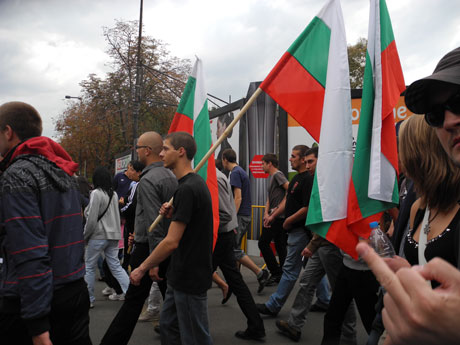
Claiming to be the “true Bulgarians,” young nationalists and anti-Roma protesters march down the central pedestrian street in Sofia. Thousands of protesters marched in similar protests throughout the country nearly every night since a Bulgarian boy was killed in the village of Katunitsa on September 23rd. (Photo: Elana Resnick)
Many residents of Fakulteta are investing in guard dogs, keeping themselves awake all night, waiting to hear if the Bulgarian protesters are entering their neighborhood to harass or attack inhabitants. Anti-Roma sentiment has long been a problem in Bulgaria, but violence has escalated since a 19-year-old Bulgarian boy was killed last weekend by a car allegedly driven by a relative of Kiril Rashkov, one of Bulgaria's rich criminals, who also happens to be Roma.
Although Rashkov calls himself “king,” he is a leader to no one, and Bulgarians as well as Roma publicly condemn his role in criminal practices. But what no one is admitting is just how his criminal activity got so far, who condoned (and benefited from) it since communist days and who during the tumultuous transition period of the 1990s turned a blind eye. Now, instead of asking these questions, many Bulgarians are being influenced by media and nationalist political parties that are using this tragic car accident to provoke ethnic tensions, pitting Bulgarians against Roma. And these tactics have worked: many Bulgarians in Sofia care more about the Roma origins of the driver than anything else in the case.
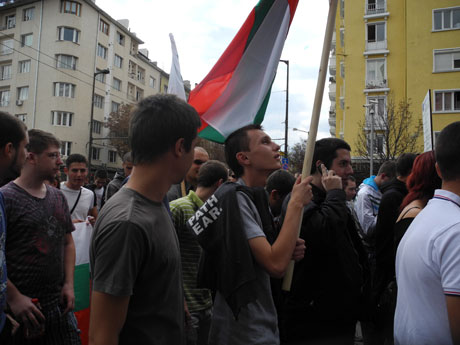
Young nationalists and anti-Roma protesters march down Vitosha Boulevard, the central pedestrian street in Sofia. Estimates indicate protesters in Sofia on October 1, 2011 numbered over 2000. (Photo: Elana Resnick)
Night after night, young protesters, most between the ages of 16 and 19, chant in the streets of Sofia and around Bulgaria, “Death to Gypsies,” “Gypsies into soap” and “Turks under the knife.”
High school students post on Facebook to organize mass marches throughout the country. In one group dedicated to anti-Roma marches in the town of Pleven, a student posts: “Gypsies raised Bulgarian flags in a sign of peace … I am against the truce! Let everyone who agrees with me to click: I like.” Another writes, “Gypsies live like kings while we live in poverty, why is it so?”
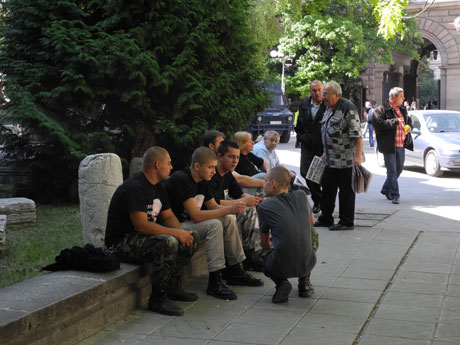
A group of young ultra-nationalist Ataka supporters sit and smoke cigarettes outside the National Archaeological Museum, which is located in the building of Sofia's largest and oldest mosque. (Photo: Elana Resnick)
Since the accident, high school students and their parents pass out campaign literature for ultra-nationalist parties like Ataka (“Attack” in Bulgarian) in Sofia subway stations, promoting Ataka's controversial presidential candidate Volen Siderov. As children, they are excited to have a chance to travel from the provinces of the country to the capital city and wear their Ataka flags like capes. But the campaign materials they distribute are far from childish: the cover article of Ataka's newspaper is entitled “Gypsy Crime-Threat to the Public,” above a picture of Kiril Rashkov, complete with a Mercedes and castle-like home.
The car accident seems to come at a strategic time for nationalist parties that are entering their pre-election campaigns, which in previous years have included street parties with food and drink for potential voters and children's entertainment in local parks. “At this point the Bulgarians have shown their hatred towards the gypsies and I think that there is no one to protect us. It is all because of the elections” says Stefka Yotova, 49, a well-respected business owner in the Roma neighborhood of Fakulteta in Sofia. This time, candidates are using the case for votes, instead of just walking into the neighborhood and buying them, which has been a major issue for Roma communities in past Bulgarian elections: “Now they're doing it in a more intelligent way, not like before. They used to buy us off with a sausage and 5 euro, now it's for the price of a life.”
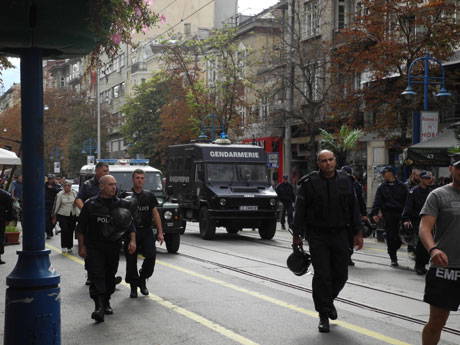
Hundreds of armed police officers monitor anti-Roma protests in Sofia. Here, they walk down the main pedestrian street in central Sofia during a mass march of more than 2000 people on October 1, 2011. Other police were positioned throughout the city, in armored cars, on horses, and with police dogs. (Photo: Elana Resnick)
Mrs. Yotova, asks the question most Roma in Bulgaria are asking now, wondering why people focus on Kiril Rashkov instead of the multitude of other Bulgarian politicians who have been found to be deeply involved in criminal activity. “Why don't they turn their eyes towards how Bulgarians live, the ones in Parliament?” Yotova asks. “They [high-up Bulgarian officials] turned him into a criminal … and now Kiril Rashkov doesn't pay taxes, but is he the only one that doesn't pay taxes? The most famous and the biggest don't pay taxes, all over the world.”
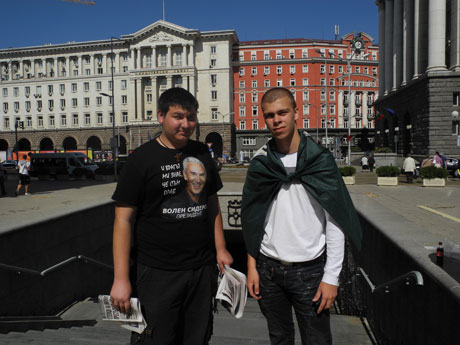
Teenage supporters of the ultra-nationalist, anti-Gypsy party Ataka travel to Sofia from throughout the country to distribute campaign materials after the killing of a 19-year-old boy in the village of Katunitsa. He and friends came to Sofia for three days following the incident to support Ataka while their parents stayed in their hometowns to work. (Photo: Elana Resnick)
Instead of focusing on issues facing all Bulgarians – increasing food prices, decreasing job opportunities, high-level government corruption and the constant struggle of how to access European Union funds – Bulgarians are blaming all the country's troubles on the Roma. “There was a murder in Bulgaria. The Gypsies killed him … We have a big war of Gypsy crime in all of Bulgaria,” Ataka chairman and presidential candidate, Siderov said in a private interview, reiterating the party's focus on “Gypsy crime.” The party's idea for solving this “problem” includes promoting gun possession for all Bulgarians and sponsoring informal militia-like groups to protect farmers from “the Gypsies who steal their crops.” When asked if Siderov would support Roma in forming militias to protect themselves from Bulgarian organized crime, his public relations rep ignored the question.

An 18-year-old Ataka party supporter (left) distributes campaign materials outside of the Bulgarian presidential office, wearing a T-shirt of Ataka presidential candidate Volen Siderov and his famous slogan, “Even my enemy knows I'm right.” Still in high school, a teen-aged Ataka party supporter (right) wears a cape bearing the insignia of the party he supports. Many believe that Ataka has capitalized on the killing of a Bulgarian youth in the village of Katunitsa to promote their party's anti-Roma platform in the upcoming October 23rd elections. (Photos: Elana Resnick)
Bulgarians are frustrated with its slowing economy and position as the poorest country in the EU, but rather than directly addressing the EU, national government officials or big business investors, they are turning to the Roma, focusing on long-standing ethnic tensions that have escalated since the 1990s and peaked since the country's EU accession in 2007. As one staff member of a well-known international organization explained, “right now it looks like a civil war could just break out.”
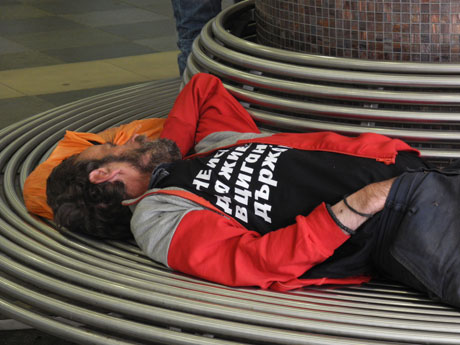
A homeless man sleeps in a Sofia subway station following anti-Roma protests on October 1, 2011. His t-shirt, distributed by protesters, proclaims “I don't want to live in a Gypsy state.” (Photo: Elana Resnick)
We have 10 days to raise $50,000 — we’re counting on your support!
For those who care about justice, liberation and even the very survival of our species, we must remember our power to take action.
We won’t pretend it’s the only thing you can or should do, but one small step is to pitch in to support Truthout — as one of the last remaining truly independent, nonprofit, reader-funded news platforms, your gift will help keep the facts flowing freely.
